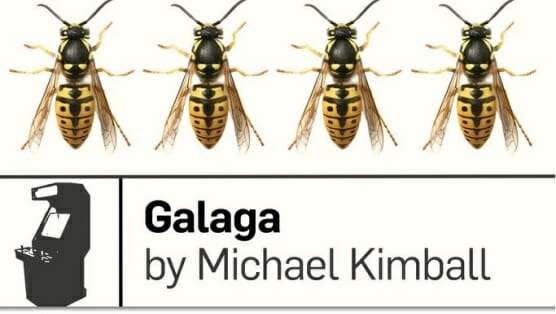The newest offering from Boss Fight Books, Michael Kimball’s Galaga, is an exploration of Kimball’s personal history through the classic arcade game. Split up into 255 microchapters, the book weaves its way through intense personal stories from Kimball’s childhood, contemporary encounters with the game, analyses of the ways a “good” player might interact with the game, and factoids about various modifications of Galaga down through the years. Of course, most of these modifications are made up, as the author reveals over and over again, but that’s the least of Galaga’s problems.
I will be clear at the top here and say two things. One: I believe that Galaga is far and away the weakest release so far from Boss Fight Books’ generally strong opening catalog. Two: I found this book to be incredibly frustrating to both read and become engrossed by. Galaga was a book I couldn’t wait to get away from, and I found myself drifting, checking my email, and generally trying to disengage from the book constantly. One of the reasons for this might be the short, staccato chapters that mimic the stages of Galaga itself. More than that, the “types” of chapters repeat themselves very often, cycling through the history of Kimball, the history of Galaga, and play maneuvers. While the formal device of mimicking a short, repeated structure is clever, it reads like a gimmick, and I was quickly tired of it.
In fact, if there’s any word that describes Galaga better than “gimmick,” it has to be “indulgent.” When Kimball describes the act of playing Galaga, he goes in full-blast, narrating the smallest movements of both his hands and the sprites moving on screen. However, these fine descriptions never amount to anything. Instead, the reader is left with pages and pages of prose that lead nowhere, with no greater insight gained beyond the fact that the author can bloodlessly describe an arcade game.
I don’t mean to say that I cannot slog through something that I find boring or counter-productive in a book. If these problems were limited to merely one type of writing out of several in the book, I would remark on that and continue on, but this attitude of indulging in overwriting is omnipresent. Several times we’re given chapters about a “hack” of Galaga like Galaga Bin Laden “where Bin Laden’s head is placed over the ‘la’ in the Galaga marquee and framed within crosshairs.” After explaining how the entire game is modified to fit this theme, the chapter ends. A few chapters later, Kimball reveals that the hack isn’t real and that he’s made it up. This joke might work once, playing with our expectations about how ingrained Galaga is in contemporary culture. Kimball does it three times, grinding it into the ground, amidst scores of other chapters on actual hacks. Scattered amongst these are lists of artists who wrote sounds about the game (the Beastie Boys), items you can buy with Galaga ships on them (backpacks), and films that reference the game (The Karate Kid). There was a point where I honestly wondered if there was a difference between reading this book and reading Wikipedia cross-referenced with TV Tropes was. I don’t have an answer.
Buried within this edifice of consumer items and writerly reversals, Kimball does manage to tell a very personal story about his upbringing, abuse, childhood friendship and coping with the world through videogames. It is a subject that many, many people can relate to, and Kimball does an expert job of weaving his feelings, anxieties about his home life, and his desire to be in the arcade together into a wonderful tapestry. It is a moving narrative, and more importantly, it feels honest. In a lot of ways, the clarity and craft exhibited in these sections makes the rest of the book more disappointing.
Galaga was written by Michael Kimball and published by Boss Fight Books.
Cameron Kunzelman tweets at @ckunzelman and writes about games at thiscageisworms.com.
